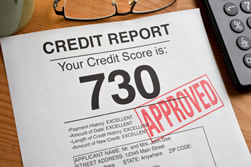 Bad credit can be limiting and anxiety inspiring to those dealing with low scores. Rather than trying quick fix methods that inevitably fail, accept that the most effective cure for your credit will take time and patience.
Bad credit can be limiting and anxiety inspiring to those dealing with low scores. Rather than trying quick fix methods that inevitably fail, accept that the most effective cure for your credit will take time and patience.
Smart Tips To Increasing Your Credit
Scores And Getting Loan Approval
 Bad credit can be limiting and anxiety inspiring to those dealing with low scores. Rather than trying quick fix methods that inevitably fail, accept that the most effective cure for your credit will take time and patience. If you have been irresponsible with your spending in the past, you will need to change your habits in order to really see improvement in your credit score.
Bad credit can be limiting and anxiety inspiring to those dealing with low scores. Rather than trying quick fix methods that inevitably fail, accept that the most effective cure for your credit will take time and patience. If you have been irresponsible with your spending in the past, you will need to change your habits in order to really see improvement in your credit score.
Where Should I Start?
In the midst of dealing with poor credit, it can be hard to gain perspective on exactly how to move forward. First and foremost, it is important to request a free copy of your credit report. Having this in front of you can help you to identify where the issues lie.
Are you surprised that your score is low? It is possible that someone made an error along the way. Keep your eyes peeled for incorrectly listed late payments, and check to make sure that the amount of money you owe is accurate. If you discover any discrepancies on your report, contact the reporting agency as well as the credit bureau to sort out the issue.
{loadposition inlinetext}
Remind Yourself
Life can get hectic. With so many moving parts, remembering to make on time credit payments can seem like a fantasy. If this is the case, there is probably an easy solution. Get in touch with your bank to determine if there is a way to set up payment notifications. Many banks offer online banking that allows you to customize settings, such as important reminders, without much effort.
Automatic payments are another great way to alleviate the consequences of forgetfulness. To ensure you do not miss a payment, contact your loan and credit card providers to set up automatic payments. Be weary of relying too heavily on this method though, because the payments made are only the minimum amount required.
Reduce Your Debt
In order to really be effective in this endeavor, you will want to discontinue use of your credit cards. While factoring in your interest rates and how much you owe for each account you have open, determine a plan for payment that works with your budget. It may be difficult, but you will want to allot most of your funds to paying off your debt, focusing first on the credit cards with the highest interest rates. Make sure you are not missing payments on any of your accounts. This may mean making the minimum payment on other cards with lower interest rates.
Repair and Maintain
As you read above, make sure you are making payments on time. The impact delinquent payments have on your score can be very damaging. Even if you have a history of late payments, the benefit of getting on track now is immense. Building a track record of timely payments will be reflected in your credit score, and your history will become less relevant as time passes.
If you have been dealing with collection agencies, it is a good idea to pay off any bills you have with them. However, even if your bill is taken care of, be aware that this will stay on your report for seven years. While this is unfortunate, remember that it will eventually disappear from your record.
Do not be afraid to seek help from a credit counselor. While managing your credit and making timely payments will not instantly be reflected in your credit score, it will help you see increases over time. Talking to a counselor can help you get advice on the best choices to make if you are having a hard time getting by financially. Receiving advice will not negatively impact your score.
Approaching Your Current Credit Card Balances
The amount of debt you have will affect your credit score. Do everything you can to keep your credit card balances low. While it can be appealing to rearrange your debt, you will benefit more from paying it off. If you have fewer accounts open, this may have a positive influence on your credit score. Shy away from getting rid of unused credit cards; this will not be an effective way to raise your credit score in the long run. On the other hand, do not try to increase the credit available by opening more cards. This could be detrimental to your score.
New Credit
Avoid opening many accounts too quickly. Not only does this look like risky behavior for new credit users, but it lowers your average account age. This is especially important to remember if your other credit information is limited.
Keep in mind that it can be beneficial to create parameters when looking around for loan rates. When searching for a loan, keep your inquiries limited to a specific frame of time. This makes it clear that your efforts were focused, rather than being an ongoing search for new credit lines.
Do not be afraid to get a copy of your credit report, but make sure you are getting it directly through an organization that has authorization to give consumers credit reports, or through the credit reporting agency.
Make sure you are only opening credit accounts if they are necessary. Having a range of accounts is not likely to increase your credit score. It is important to have credit cards, because not having any can make you more susceptible to risk than someone who has demonstrated responsible use of their credit cards. Remember, even a closed account will appear on your credit report and could possibly be reflected in your credit score.
Change Your Habits and Look Ahead
It may not be easy to apply all of the above steps to your life, but it is important if you want to truly fix your credit score. Do not trust any quick fixes. Instead, rely on your own ability to become more responsible with your finances. With some patience and hard work, you can be on your way to a better credit score.
©2013 Smart Life Weekly
smartcredit




